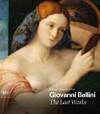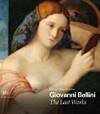
Wil je zeker zijn dat je cadeautjes op tijd onder de kerstboom liggen? Onze winkels ontvangen jou met open armen. Nu met extra openingsuren op zondag!
- Afhalen na 1 uur in een winkel met voorraad
- Gratis thuislevering in België vanaf € 30
- Ruim aanbod met 7 miljoen producten
Wil je zeker zijn dat je cadeautjes op tijd onder de kerstboom liggen? Onze winkels ontvangen jou met open armen. Nu met extra openingsuren op zondag!
- Afhalen na 1 uur in een winkel met voorraad
- Gratis thuislevering in België vanaf € 30
- Ruim aanbod met 7 miljoen producten
Zoeken
€ 90,95
+ 181 punten
Omschrijving
Bellini's last works, examined here in new scholarship, represent a triumphant swan song
An emblematic master painter of the Quattrocento, Giovanni Bellini remained active beyond that period and into the era now known as the High Renaissance. While his colleagues died or faded from view, Bellini, in the first decades of the 16th century, continued to be creatively vital: indeed, he flourished as never before.
The six paintings Bellini made during his final years (1513-16) constitute a distinct group that differs significantly from his previous works in style, support, subject and mood. Their subjects were stipulated by his patrons, but in a period in which he relied more and more on assistants, Bellini's decision to undertake and personally conceive and execute them points to a special commitment on his part to their creation. The Feast of the Gods at the National Gallery of Art, Washington, DC, and other works that follow it, such as the Woman with a Mirror in Vienna and the Drunkenness of Noah in Bensançon, display a greatly expanded range of subject matter and a new degree of inventiveness. New technical investigations have played a key role in grasping the novelty of Bellini's last works. Recent scientific investigation at the National Gallery of Art marks a major advance in the technical analysis of works of art. And it literally sheds new light on The Feast of the Gods, allowing us to see more clearly than ever before images or motifs hidden below the paint surface. With an abundance of color plates, this book is the fruit of this research, and provides a deep dive into Bellini's greatest, final, triumphant phase. Giovanni Bellini (c. 1430-1516) was one of the most influential Venetian artists of the Renaissance. He is celebrated for his pioneering portrayal of natural light, seen in such paintings as The Agony in the Garden, and for his altarpieces. His brother-in-law was Andrea Mantegna, who may have influenced Bellini's early works (Antonello da Messina, who visited him in 1475-76, is also considered a likely influence). Bellini's career spanned 65 years; toward the end of his life, Dürer wrote of him that he "is very old and yet he is the best painter of all."Specificaties
Betrokkenen
- Auteur(s):
- Uitgeverij:
Inhoud
- Aantal bladzijden:
- 400
- Taal:
- Engels
- Geïllustreerd:
- Ja
Eigenschappen
- Productcode (EAN):
- 9788857239965
- Verschijningsdatum:
- 26/11/2019
- Uitvoering:
- Hardcover
- Formaat:
- Genaaid
- Afmetingen:
- 249 mm x 287 mm
- Gewicht:
- 2494 g

Alleen bij Standaard Boekhandel
+ 181 punten op je klantenkaart van Standaard Boekhandel
Beoordelingen
We publiceren alleen reviews die voldoen aan de voorwaarden voor reviews. Bekijk onze voorwaarden voor reviews.











